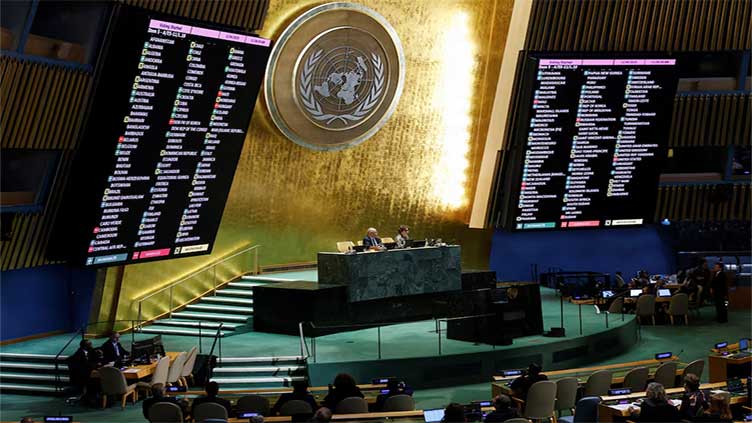UN Security Council adopts neutral US stance on war in Ukraine as Trump pursues end to conflict

World
The short resolution reflects Trump's more conciliatory stance towards Russia
UNITED NATIONS (Reuters) – The United Nations Security Council on Monday adopted a US-drafted resolution on the third anniversary of Russia's invasion of Ukraine that takes a neutral position on the conflict as US President Donald Trump seeks to broker an end to the war.
The short resolution reflects Trump's upending of US policy on Ukraine after taking office last month and his more conciliatory stance towards Russia. In contrast, former president Joe Biden's administration led efforts at the United Nations to support Ukraine throughout the war.
Russia's UN Ambassador Vassily Nebenzia acknowledged "constructive changes" in the US position on the conflict. He told the council the resolution was "not an ideal one," but "a starting point for future efforts towards peaceful settlement."
The 15-member UN Security Council had been deadlocked throughout the war and unable to take any action because Russia holds a veto.
But the 193-member General Assembly has repeatedly supported Ukraine's sovereignty and territorial integrity and called for a just, lasting and comprehensive peace in line with the UN Charter.
The US failed earlier on Monday to convince the General Assembly to pass the same three-paragraph resolution adopted by the Security Council.
The resolution mourns the loss of life in the "Russia-Ukraine conflict", reiterates the UN's purpose is to maintain international peace and security and peacefully settle disputes, and urges a swift end to the conflict and a lasting peace.
Security Council resolutions are considered binding, while General Assembly resolutions are not. However, General Assembly resolutions carry political weight, reflecting a global view on the war.
The Security Council adopted the US resolution with 10 votes in favor, while France, Britain, Denmark, Greece and Slovenia abstained. Russia voted in favor after failing to amend it and vetoing European bids to add language supporting Ukraine.
"This resolution puts us on the path to peace. It is a first step, but a crucial one – one of which we should all be proud," acting US Ambassador to the UN Dorothy Shea told the council. "Now we must use it to build a peaceful future for Ukraine, Russia and the international community."
'NO EQUIVALENCE'
However, Trump's approach to mediation has left Ukraine and European allies wary of his focus on Russia and worried they could be cut out of talks to end the war.
Britain's UN Ambassador Barbara Woodward told the council that the terms of peace in Ukraine matter and must "send a message that aggression does not pay."
"This is why there can be no equivalence between Russia and Ukraine in how this council refers to this war. If we are to find a path to sustainable peace, the council must be clear on the war's origins," she said.
French UN Ambassador Nicolas de Riviere – whose President Emmanuel Macron met with Trump in Washington on Monday – said that while France was "fully committed to peace in Ukraine, we call for comprehensive, just and lasting peace, and certainly not for capitulation of the victim."
The General Assembly earlier adopted two resolutions, one drafted by Ukraine and Europeans and one drafted by the US that was amended by the assembly to include its long-held language supporting Ukraine. Those votes gave Ukraine and European states a diplomatic victory over Washington.
"This war has never been about Ukraine only. It is about a fundamental right of any country to exist, to choose its own path and to live free from aggression," Ukraine's Deputy Foreign Minister Mariana Betsa told the assembly before the vote.
The amended US-drafted resolution won 93 votes in favor in the assembly, while 73 states abstained and eight voted no. Russia failed in a bid to amend the US text to include a reference to the "root causes" of the conflict.
The resolution drafted by Ukraine and European countries passed with 93 votes in favour, 65 abstentions and 18 no votes. Along with the United States, some other countries that voted no were Russia, North Korea and Israel.
PAKISTAN’S STANCE
The Pakistani Representative and Ambassador to the United Nations, Asim Iftikhar, stated that Pakistan supported the resolution because “peace is a common goal that can only be achieved through collective and comprehensive thinking.”
He said that the reason for supporting the resolution is to respect the principles of self-determination and sovereignty for the people. “Pakistan opposes the acquisition of any territory through force, and the principles of the United Nations should be applied without any prejudice.”


